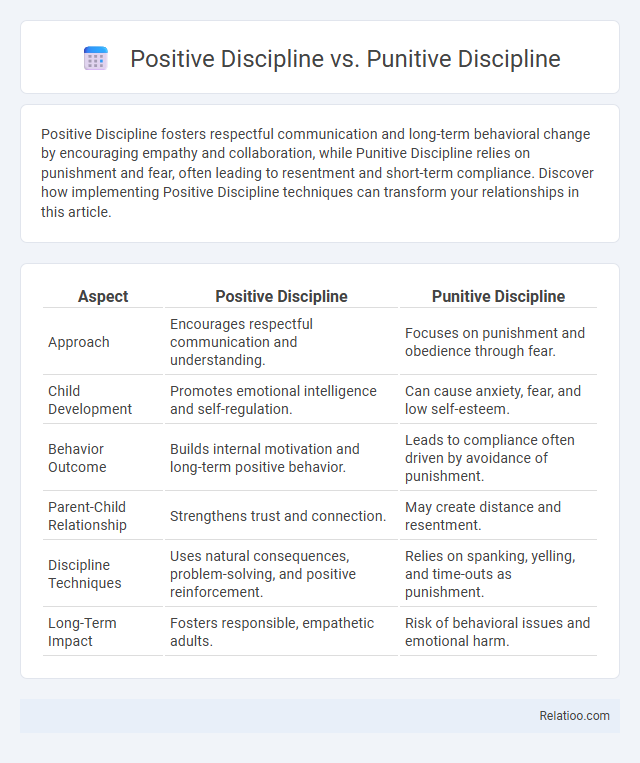Positive Discipline fosters respectful communication and long-term behavioral change by encouraging empathy and collaboration, while Punitive Discipline relies on punishment and fear, often leading to resentment and short-term compliance. Discover how implementing Positive Discipline techniques can transform your relationships in this article.
Table of Comparison
| Aspect | Positive Discipline | Punitive Discipline |
|---|---|---|
| Approach | Encourages respectful communication and understanding. | Focuses on punishment and obedience through fear. |
| Child Development | Promotes emotional intelligence and self-regulation. | Can cause anxiety, fear, and low self-esteem. |
| Behavior Outcome | Builds internal motivation and long-term positive behavior. | Leads to compliance often driven by avoidance of punishment. |
| Parent-Child Relationship | Strengthens trust and connection. | May create distance and resentment. |
| Discipline Techniques | Uses natural consequences, problem-solving, and positive reinforcement. | Relies on spanking, yelling, and time-outs as punishment. |
| Long-Term Impact | Fosters responsible, empathetic adults. | Risk of behavioral issues and emotional harm. |
Understanding Positive Discipline
Positive Discipline emphasizes teaching and guiding children through respect and encouragement, promoting long-term behavioral growth without fear or punishment. Unlike Punitive Discipline, which relies on consequences and control, Positive Discipline fosters problem-solving skills and emotional intelligence in Your child's development. Inclusive parenting integrates elements of Positive Discipline by validating diverse needs and promoting empathy, ensuring a supportive environment for every family member.
Defining Punitive Discipline
Punitive discipline refers to discipline strategies that rely on punishment, such as physical punishment, yelling, or harsh consequences, to correct a child's behavior. Unlike positive discipline, which emphasizes teaching and guiding your child through understanding and encouragement, punitive methods often instill fear or resentment. Inclusive parenting promotes empathy and collaboration, aiming to create a supportive environment where your child learns appropriate behavior through mutual respect.
Core Principles of Positive Discipline
Positive Discipline centers on mutual respect, encouragement, and long-term behavioral growth, emphasizing understanding and teaching rather than punishment. Unlike punitive discipline, which relies on consequences and control, Positive Discipline fosters intrinsic motivation and problem-solving skills in children. Inclusive parenting integrates Positive Discipline's principles by promoting empathy and cooperation while respecting each child's unique needs and strengths.
Negative Effects of Punitive Discipline
Punitive discipline often leads to increased aggression, anxiety, and lower self-esteem in children, negatively impacting their emotional development. Unlike positive discipline and inclusive parenting, which promote empathy and self-regulation, punitive methods tend to foster fear and resentment. Research shows that harsh punishment correlates with long-term behavioral issues and impaired parent-child relationships.
Long-term Outcomes: Positive vs. Punitive Approaches
Positive discipline fosters long-term emotional intelligence and resilience by encouraging self-regulation and respectful communication, resulting in healthier parent-child relationships and improved social skills. Punitive discipline often leads to increased aggression, anxiety, and diminished self-esteem, negatively impacting mental health and academic performance over time. Inclusive parenting combines elements of positive discipline with cultural sensitivity and empathy, promoting a supportive environment that enhances a child's overall well-being and adaptability.
Emotional Impact on Children
Positive Discipline fosters emotional resilience by encouraging empathy and self-regulation, helping children feel understood and supported. Punitive Discipline often leads to fear, anxiety, and diminished self-esteem, negatively affecting Your child's emotional well-being. Inclusive parenting promotes a sense of belonging and emotional security by validating children's feelings and involving them in problem-solving.
Building Trust Through Positive Discipline
Building trust through positive discipline involves consistent, respectful communication that encourages children to understand consequences without fear, fostering emotional security. Unlike punitive discipline, which relies on punishment and can erode trust, positive discipline promotes problem-solving skills and mutual respect. Inclusive parenting integrates these principles by recognizing children's individuality and cultural backgrounds, enhancing trust and cooperation within the family dynamic.
Behavioral Change: Which Method Is More Effective?
Positive discipline fosters long-term behavioral change by encouraging intrinsic motivation through respect and clear boundaries, whereas punitive discipline often leads to short-term compliance but can increase fear, resentment, and defiance. Inclusive parenting promotes behavioral change by involving children in decision-making and problem-solving, enhancing emotional intelligence and self-regulation. Research consistently shows that positive and inclusive approaches result in more sustainable and healthier behavioral outcomes compared to punitive methods.
Practical Strategies for Positive Discipline
Positive Discipline employs practical strategies such as setting clear expectations, using natural consequences, and encouraging problem-solving to promote respectful and responsible behavior in children. Unlike Punitive Discipline, which relies on punishment and fear to enforce rules, Positive Discipline focuses on teaching and reinforcing desired behaviors through positive communication and emotional support. Inclusive parenting integrates these methods by fostering empathy and cooperation, adapting disciplinary approaches to meet diverse family needs and cultural backgrounds.
Moving from Punishment to Guidance
Positive Discipline emphasizes teaching and guiding children through respectful communication and natural consequences, fostering long-term emotional growth. Punitive Discipline relies on punishment and control, often leading to fear and resentment rather than understanding. Inclusive Parenting combines empathetic support with consistent boundaries, promoting collaboration and mutual respect while moving away from harsh punishment toward constructive guidance.

Infographic: Positive Discipline vs Punitive Discipline
 relatioo.com
relatioo.com